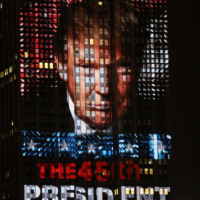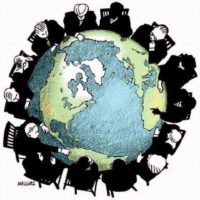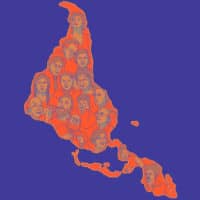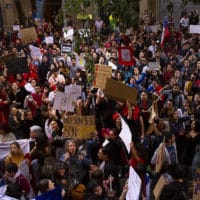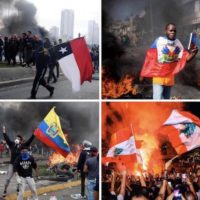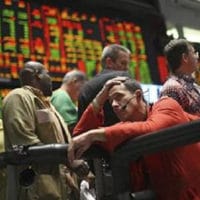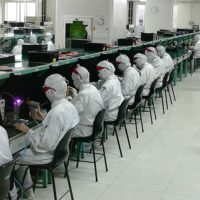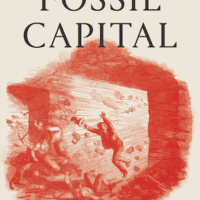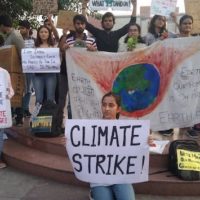-
Record inequality and corporate profits are what media call a ‘strong economy’
Last month, CNBC (10/7/19) reassured us that fears of a potential recession are “overblown,” because the “hard data” shows that the “U.S. economy remains strong.”
-
The coup in Bolivia has everything to do with the screen you’re using to read this
The nationalization efforts of Evo Morales ensured that the State controlled 51 percent of all private energy firms that operated in Bolivia, which allowed the State’s coffers to fill rapidly. It was this money that was invested to go after poverty, hunger, and illiteracy.
-
A wealth tax: because that’s where the money is
The bank robber Willie Sutton, when asked by a reporter why he robbed banks, is reputed to have answered, “Because that’s where the money is.” Which brings us to a wealth tax.
-
The empire, Trump and intra-ruling class conflict
Over the past few months President Trump has unilaterally by Tweet and telephone begun to dismantle the U.S. military’s involvement in the Middle East. The irony is amazing, because in a general overarching narrative sense, this is what the marginalized antiwar movement has been trying to do for decades.(1) Prof. Harry Targ, in his important […]
-
Apartheid in the global governance system
In my research I have argued that rising global inequality is driven in large part by power imbalances in the global economy, in that rich countries have disproportionate influence when it comes to setting the rules of international trade and finance.
-
Dossier 22: Latin America and the Caribbean: between the neoliberal offensive and new resistances
Critical thought in our current political conjuncture faces a debate about the characteristics of the neoliberal and neofascist offensive and the challenges that these offensives raise. This debate engages three important dimensions: the character of contemporary capitalism, the new monsters that drive it, and the possibility of necessary alternative futures.
-
The political tide sweeping South America won’t accept predatory capitalism
The slogan is pithy—Neoliberalismo nunca más (Neoliberalism Never Again). It was chanted in the streets of Santiago, Chile; it was drawn on the walls in Buenos Aires, Argentina; and in a more sober register, it is mentioned in a seminar in Mexico City, Mexico.
-
Changing the subject
From Chile to Lebanon, young people are demonstrating—in street protests and voting booths—that they’ve had enough of being disciplined and punished by the current development model.
-
Another look at the Federal Reserve’s panic in September 2019 and solutions to the crisis
You may recall that from 17 September 2019, the United States Federal Reserve injected massive amounts of liquidity into banks due to a quite abnormal situation on the repo market.(1) The repo market designates a mechanism used by banks to obtain short-term financing. They sell securities they hold in repurchase agreements (repo).
-
Flying above the clouds: the U.S. military and climate change
Climate change is occurring, highlighted by dramatically shifting weather patterns and ever more deadly storms, floods, droughts, and wildfires. And the evidence is overwhelming that it is driven by the steady increase in greenhouse gases in our atmosphere, especially carbon dioxide and methane, produced by our fossil fuel-based economic system.
-
Globalisation’s corroding edifice
The World Bank’s World Development Report (WDR), published every year since 1978, plays a similar role to that of the state of the union address in the US, in which the president hopes to keep the faith of the Congress and public.
-
The U.S. armed and funded extremists in Syria
The US armed and funded extremists in Syria to overthrow the Syrian government and the media cheered. Those same extremists then attacked the Kurds on Turkey’s behalf to the horror of the same media. Now what?
-
The IMF does not fight financial fires but douses them with gasoline
On 13 October, Moreno had to promise to withdraw Decree 833. Pressure from the streets, from the United Nations, and from the Ecuadorian Episcopal Conference forced him to the table, where a televised discussion was held. The indigenous leaders won the ‘debate’–they were much more prepared and far more humane than the president and his clumsy ministers.
-
Ireland is a racket (for foreign capital)
For 60 years Ireland has based its economy on attracting in foreign direct investment. And what’s has it got to show for it? One of the highest per capita national debts in the world and one of the highest rent regimes in the world.
-
Dossier 21: The neoliberal attack on rural India
If human agency, driven by a model of economics and development gone berserk, is a major driving factor in the changes upon us, there is plenty to be learned from this region and many like it.
-
No Depression in Heaven with Alison Collis Greene
In this episode of Money on the Left, we speak with historian Alison Collis Greene about her book No Depression in Heaven with an eye toward contemporary debates around the Green New Deal. Subtitled The Great Depression, the New Deal, and the Transformation of Religion in the Delta, Greene’s book critiques what she calls the […]
-
FX & Imperialism
What affects the exchange rate of a country’s currency? The answer depends on where that country stands in the world economy. Not simply because an exchange rate is the value of one currency versus another, so that you must weigh up two or more countries.
-
Impeachment watch
In their crusade to get Trump and distract from their own corruption, the Democrats have moved on from Russiagate to an impeachment inquiry over “Ukrainegate.”
-
It is time to try out an “ecological Leninism” – Interview with Andreas Malm
Andreas Malm interviewed about Marxist approaches to the climate movement.
-
Struggle for climate change is a struggle against capitalism
The struggle against inequality and for destruction of capital is innately linked with struggle for man-nature dialectics of the higher order where earth does not remain a commodity to be exploited.




